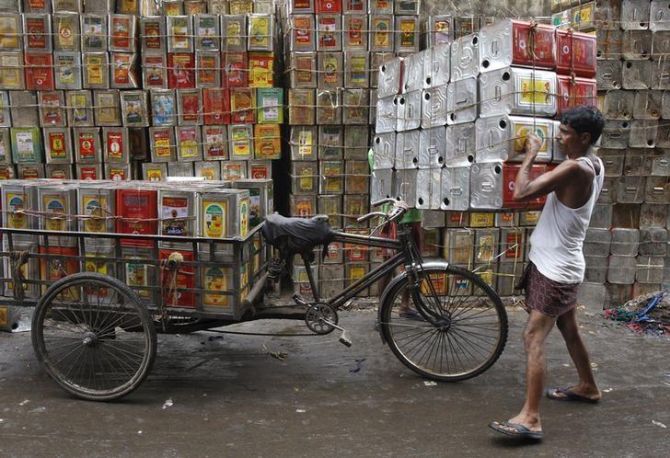India Seeks Import Duty Hike for Edible Oil Self-Sufficiency
By Rediff Money Desk, New Delhi Aug 28, 2024 22:16
Niti Aayog proposes raising import duty on edible oils to boost domestic production and make India self-sufficient in edible oil production.

New Delhi, Aug 28 (PTI) Niti Aayog on Wednesday said higher import duty on edible oils and a substantial duty gap between crude and refined oil can help India become Atmanirbhar in edible oil production.
The Aayog, in a report titled 'Pathways and Strategy for Accelerating Growth in Edible Oil towards Goal of Atmanirbhartar', further said leveraging public-private partnerships is crucial for accelerating edible oil production, utilising private sector expertise in technology, marketing, seed production, and area promotion across all oilseed crops, including oil palm, with buy-back arrangements.
"A flexible tariff structure, responsive to global market prices, domestic supply and demand trends, and the Minimum Support Price (MSP) for oilseeds, offers a strategic approach," the report said.
India currently fulfils only 40-45 per cent of its edible oil requirements through domestic production, presenting a significant challenge to the nation's 'self-sufficiency' goal.
"Implementing a higher import duty regime can safeguard domestic production, while a substantial duty gap between crude and refined oil will benefit processing industries," it added.
The report also suggested that aligning support prices with the import duty structure will support farmers, processors, and consumers alike.
Over the past decades, per capita consumption of edible oil has witnessed a dramatic rise, reaching 19.7 kilograms per year (kg/year).
This surge has outpaced domestic production and has translated into a heavy reliance on imports to meet domestic demand and industrial needs.
Consequently, the import volume of edible oils reached 16.5 MT in 2022-23, representing a rise of about 67 per cent, highlighting a growing dependence on external sources.
Palm oil dominates these imports, accounting for 59 per cent, followed by soybean (23 per cent) and sunflower (16 per cent).
The report noted that Open General Licenses (OGLs) are a crucial facilitator, enabling essential imports to bridge the demand-supply gap for edible oils in India.
It recommended that customised cluster technology needs to be developed to improve yield and establish AgroEcological Sub Region (AESR)-based crop-specific model farms to facilitate the horizontal spread of advanced technologies.
According to the report, promoting large-scale "captive plantations" and dedicated oil palm "seed gardens" is crucial to boosting domestic edible oil production.
"Declaring oil palm as a plantation crop would streamline regulations and facilitate land allocation," the Aayog suggested.
The Aayog, in a report titled 'Pathways and Strategy for Accelerating Growth in Edible Oil towards Goal of Atmanirbhartar', further said leveraging public-private partnerships is crucial for accelerating edible oil production, utilising private sector expertise in technology, marketing, seed production, and area promotion across all oilseed crops, including oil palm, with buy-back arrangements.
"A flexible tariff structure, responsive to global market prices, domestic supply and demand trends, and the Minimum Support Price (MSP) for oilseeds, offers a strategic approach," the report said.
India currently fulfils only 40-45 per cent of its edible oil requirements through domestic production, presenting a significant challenge to the nation's 'self-sufficiency' goal.
"Implementing a higher import duty regime can safeguard domestic production, while a substantial duty gap between crude and refined oil will benefit processing industries," it added.
The report also suggested that aligning support prices with the import duty structure will support farmers, processors, and consumers alike.
Over the past decades, per capita consumption of edible oil has witnessed a dramatic rise, reaching 19.7 kilograms per year (kg/year).
This surge has outpaced domestic production and has translated into a heavy reliance on imports to meet domestic demand and industrial needs.
Consequently, the import volume of edible oils reached 16.5 MT in 2022-23, representing a rise of about 67 per cent, highlighting a growing dependence on external sources.
Palm oil dominates these imports, accounting for 59 per cent, followed by soybean (23 per cent) and sunflower (16 per cent).
The report noted that Open General Licenses (OGLs) are a crucial facilitator, enabling essential imports to bridge the demand-supply gap for edible oils in India.
It recommended that customised cluster technology needs to be developed to improve yield and establish AgroEcological Sub Region (AESR)-based crop-specific model farms to facilitate the horizontal spread of advanced technologies.
According to the report, promoting large-scale "captive plantations" and dedicated oil palm "seed gardens" is crucial to boosting domestic edible oil production.
"Declaring oil palm as a plantation crop would streamline regulations and facilitate land allocation," the Aayog suggested.
Source: PTI
Read More On:
DISCLAIMER - This article is from a syndicated feed. The original source is responsible for accuracy, views & content ownership. Views expressed may not reflect those of rediff.com India Limited.
You May Like To Read
TODAY'S MOST TRADED COMPANIES
- Company Name
- Price
- Volume
- Vodafone Idea L
- 15.63 ( -4.17)
- 51716103
- Srestha Finvest
- 1.94 ( -1.02)
- 39556969
- Inventure Growth & S
- 2.47 ( -19.81)
- 31916723
- Genpharmasec Ltd
- 3.51 ( -4.88)
- 21009955
- GTL Infrastructure
- 2.68 ( -0.37)
- 16825789
MORE NEWS
Electronics Exports Surge 23% Annually, India's...
India's electronics exports have grown to become the country's 5th largest commodity,...

Sebi Revises Eligibility Criteria for...
Sebi tightens rules for stocks entering derivatives segment, requiring higher market...

Wipro to Hire 12,000 Staff in FY25,...
Wipro plans to hire 12,000 staff in FY25, prioritizing onboarding freshers who were...












 © 2024 Rediff.com India Limited. All rights reserved.
© 2024 Rediff.com India Limited. All rights reserved.